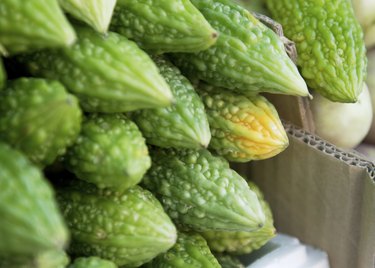
Bitter melon, a tropical fruit known by several names, including bitter gourd and wild cucumber, could be effective in controlling certain diseases. However, ripe bitter melon has toxic properties, according to clinical reports. You should speak with a doctor before self-treating with this fruit.
Tip
Bitter melon isn’t poisonous and is actually used for certain health conditions. However, toxicity from drinking its juice has been reported in studies throughout the past few years.
Video of the Day
Video of the Day
Red Bitter Melon’s Toxicity
Bitter melon is a popular gourd grown in Asia, East Africa, South America and the Caribbean, according to Winchester Hospital. You can eat the fruit either fresh or cooked, and bitter melon is also available in pill or powder form for those who don't like its pungent taste.
You should consume it with caution, however. According to a December 2015 study from the World Journal of Emergency Medicine, although consuming bitter melon is touted by healers for its ability to control certain health conditions, such as diabetes, high blood pressure, liver diseases and obesity, in the last few years, clinicians have reported suspected toxicity of its juice.
The liquid caused severe vomiting and upper gastrointestinal bleeding. But the researchers do note that this reaction is rare.
The study states that the toxic tetracyclic triterpenoid compounds are responsible for red bitter melon's toxicity, and no known antidote treats the fruit's toxoids. The researchers suggest that the public should be aware of potential health hazards from consuming this gourd and eat it heedfully.
In addition, the Memorial Sloan Kettering Cancer Center says that bitter gourd red seeds aren't edible and can cause toxicity to your body's red blood cells. This can lead to headaches, abdominal pain, fever and even put you in a coma. The red arils that cover the seeds of bitter melon are also poisonous to humans.
The Memorial Sloan Kettering Cancer Center says you should keep all parts of the bitter melon plant away from children, who are at a greater risk of a toxic reaction.
Bitter Melon’s Health Benefits
Despite the toxicity of its seeds, you can still consume bitter melon and reap the health benefits of this fruit. But you should do so after speaking with your health care professional — the long-term safety of bitter melon is not known.
The USDA says that bitter melon is a good source of vitamin C with 42 milligrams per half cup (70 percent of your daily value). The bitter fruit also includes 1 gram of fiber and and 200 IUs of vitamin A.
According to the Memorial Sloan Kettering Cancer Center, several active substances in bitter melon act in the same way as insulin — increasing the entry of glucose into cells and stimulating its storage in fat, muscle and liver.
Bitter melon might also help those with diabetes mellitus. In a July 2018 article published in the Journal of Medicinal Food, researchers conducted a three-month study on adults with diabetes. They found that taking 2,000 milligrams of bitter melon every day lessened both blood sugar and the outcome of hemoglobin A1C, the test used to measure blood sugar.
- Journal of Medicinal Food: “Momordica charantia Administration Improves Insulin Secretion in Type 2 Diabetes Mellitus”
- Memorial Sloan Kettering Cancer Center: “Bitter Melon”
- World Journal of Emergency Medicine: “Bottle Gourd (Lagenaria siceraria) Juice Poisoning”
- Winchester Hospital: “Bitter Melon”
- USDA: “Bitter Melon”
Is this an emergency? If you are experiencing serious medical symptoms, please see the National Library of Medicine’s list of signs you need emergency medical attention or call 911.